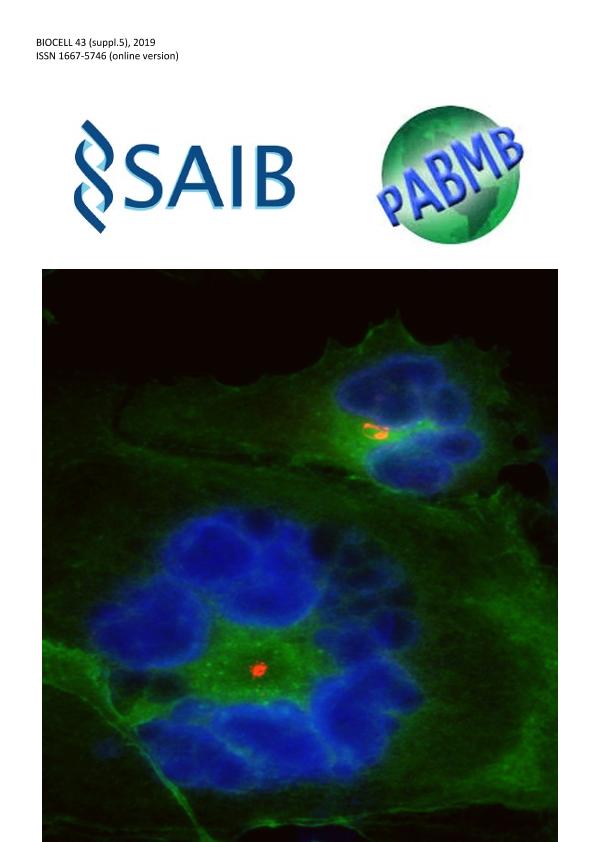Mostrar el registro sencillo del ítem
dc.contributor.author
Vazquez, Maria Magdalena

dc.contributor.author
Goldy, Camila

dc.contributor.author
Rodriguez, Ramiro
dc.contributor.author
Casalongue, Claudia

dc.contributor.author
Paris, Ramiro

dc.date.available
2022-03-30T12:53:59Z
dc.date.issued
2019
dc.identifier.citation
Nitric oxide and auxin regulate root meristem during gravitropism in Arabidopsis thaliana; The LV Annual SAIB Meeting and XIV PABMB Congress; Salta; Argentina; 2019; 61-61
dc.identifier.issn
1667-5746
dc.identifier.uri
http://hdl.handle.net/11336/154047
dc.description.abstract
The mevalonate pathway catalyzes the de novo synthesis of cholesterol, but also provides isoprenoids that may be used for protein modification through a complex process known as prenylation. Some proteins involved in oncogenic processes, such as Ras and Rho GTPases are among the targets of this modification. Pioneering studies with statins have suggested that mevalonate pathway alteration cooperates with tumor aggressiveness. More recently, other evidence has confirmed that alteration of this pathway may promote aggressive phenotypes and pointed out at enhanced protein prenylation as a possible mechanism underlying this effect. ICMT plays a central role in this posttranslational modification process by catalyzing the last step, carboxymethylation of the prenylated C-terminus in target proteins. We have recently unveiled a link between post-prenylation processing and the p53 pathway by showing that ICMT expression is repressed by wt p53, but enhanced by cancer-associated p53 point mutants. Moreover, our analysis of Breast and Lung cancer databases showed a negative correlation between ICMT expression and wt p53 status. Moreover, we found a significantly decreased metastasis-free survival frequency in patients with high ICMT expression. Basing on these results, we wondered if alteration of ICMT levels enhances metastasis development. To answer this question, we studied the effect of ICMT overexpression on metastasis in vivo, using Triple Negative Breast Cancer cells in an immunocompetent mouse model. We extended our previous analysis on breast cancer patients and we found that p53 status affects the impact of ICMT overexpression on clinical outcomes. Besides, our studies on the regulation of ICMT expression showed that other p53 family members affect its transcription. Our results suggest that ICMT levels are affected by alterations in the functional equilibrium between different members of this family during tumor progression. To explore the potential of pharmacological manipulation of ICMT function, we analyzed the impact of the ICMT inhibitor Cysmethynil to affect tumor-associated phenotypes. We found that ICMT inhibition affects clonogenic potential, as well as phenotypes associated with metastatic cells, such as migration and invasion in vitro. In an effort to develop novel ICMT inhibitors and inspired on Salirasib (S-trans-trans-farnesylthiosalicylic acid) we synthesized novel thiosalicylic acid derivatives. As a preliminary characterization, we analyzed the antiproliferative activity of our compounds in vitro on MDA-MB-231 cells. Our results suggest that ICMT overexpression affects tumor progression and that molecules interfering with the function of prenylated proteins are potentially useful in therapeutic strategies.
dc.format
application/pdf
dc.language.iso
eng
dc.publisher
Tech Science Press

dc.rights
info:eu-repo/semantics/openAccess
dc.rights.uri
https://creativecommons.org/licenses/by-nc-sa/2.5/ar/
dc.subject
ARABIDOPSIS THALIANA
dc.subject
AUXIN
dc.subject
GRAVITROPISM
dc.subject
NITRIC OXIDE
dc.subject.classification
Bioquímica y Biología Molecular

dc.subject.classification
Ciencias Biológicas

dc.subject.classification
CIENCIAS NATURALES Y EXACTAS

dc.title
Nitric oxide and auxin regulate root meristem during gravitropism in Arabidopsis thaliana
dc.type
info:eu-repo/semantics/publishedVersion
dc.type
info:eu-repo/semantics/conferenceObject
dc.type
info:ar-repo/semantics/documento de conferencia
dc.date.updated
2022-03-17T14:02:18Z
dc.journal.volume
43
dc.journal.number
Suppl 5
dc.journal.pagination
61-61
dc.journal.pais
Argentina

dc.description.fil
Fil: Vazquez, Maria Magdalena. Consejo Nacional de Investigaciones Científicas y Técnicas. Centro Científico Tecnológico Conicet - Mar del Plata. Instituto de Investigaciones Biológicas. Universidad Nacional de Mar del Plata. Facultad de Ciencias Exactas y Naturales. Instituto de Investigaciones Biológicas; Argentina
dc.description.fil
Fil: Goldy, Camila. Consejo Nacional de Investigaciones Científicas y Técnicas. Centro Científico Tecnológico Conicet - Rosario. Instituto de Biología Molecular y Celular de Rosario. Universidad Nacional de Rosario. Facultad de Ciencias Bioquímicas y Farmacéuticas. Instituto de Biología Molecular y Celular de Rosario; Argentina
dc.description.fil
Fil: Rodriguez, Ramiro. Universidad Nacional de Rosario. Centro de Estudios Interdisciplinarios; Argentina
dc.description.fil
Fil: Casalongue, Claudia. Consejo Nacional de Investigaciones Científicas y Técnicas. Centro Científico Tecnológico Conicet - Mar del Plata. Instituto de Investigaciones Biológicas. Universidad Nacional de Mar del Plata. Facultad de Ciencias Exactas y Naturales. Instituto de Investigaciones Biológicas; Argentina
dc.description.fil
Fil: Paris, Ramiro. Consejo Nacional de Investigaciones Científicas y Técnicas. Centro Científico Tecnológico Conicet - Mar del Plata. Instituto de Investigaciones Biológicas. Universidad Nacional de Mar del Plata. Facultad de Ciencias Exactas y Naturales. Instituto de Investigaciones Biológicas; Argentina
dc.relation.alternativeid
info:eu-repo/semantics/altIdentifier/url/http://www.saib.org.ar/index.php?q=node/562
dc.conicet.rol
Autor

dc.conicet.rol
Autor

dc.conicet.rol
Autor

dc.conicet.rol
Autor

dc.conicet.rol
Autor

dc.coverage
Internacional
dc.type.subtype
Reunión
dc.description.nombreEvento
The LV Annual SAIB Meeting and XIV PABMB Congress
dc.date.evento
2019-11-05
dc.description.ciudadEvento
Salta
dc.description.paisEvento
Argentina

dc.type.publicacion
Journal
dc.description.institucionOrganizadora
Sociedad Argentina de Investigación Bioquímica y Biología Molecular
dc.source.revista
Biocell

dc.date.eventoHasta
2019-11-09
dc.type
Reunión
Archivos asociados
